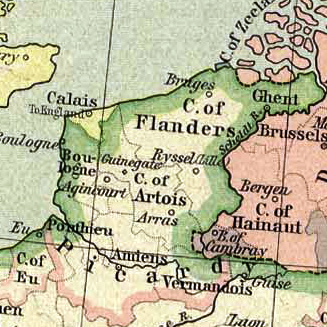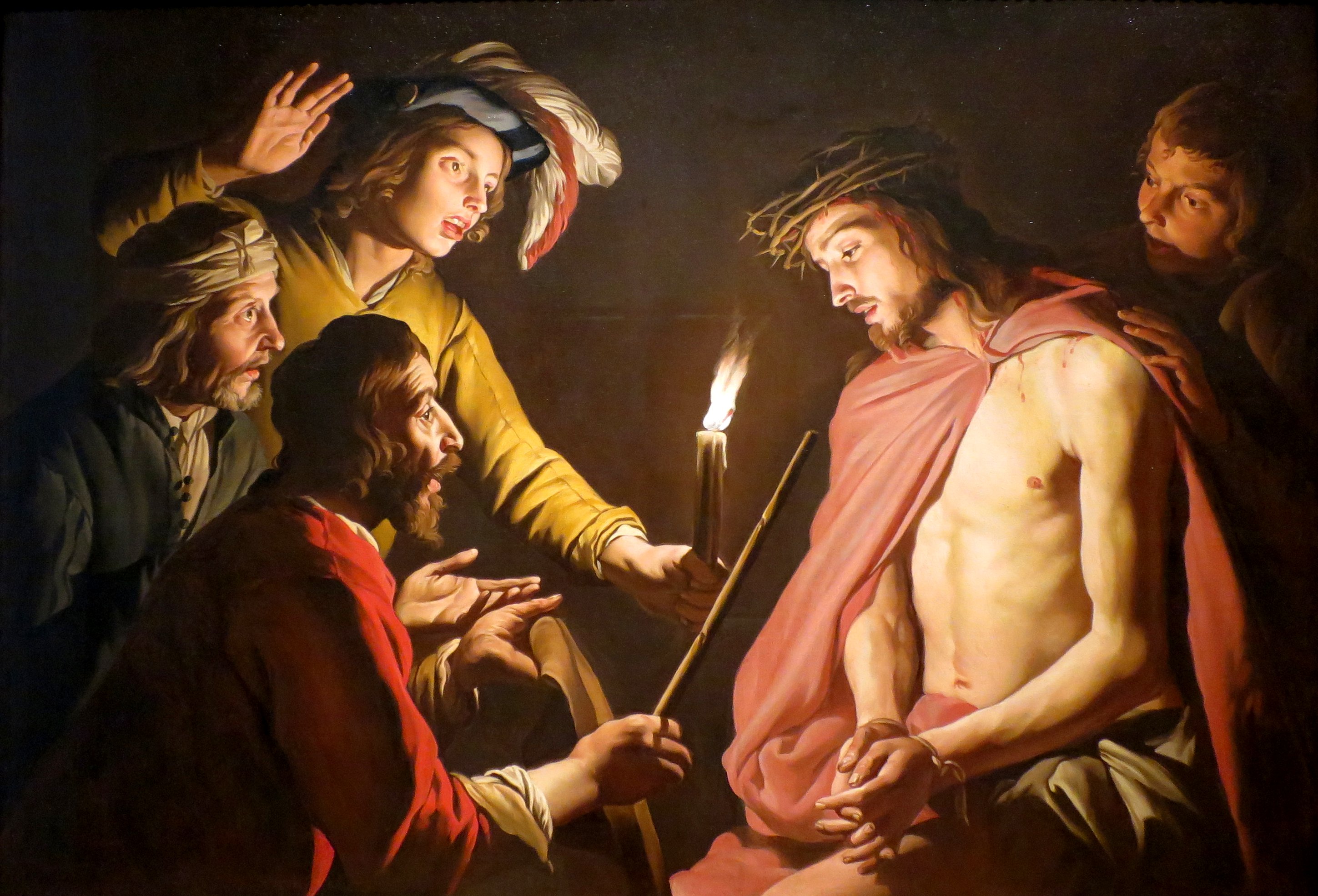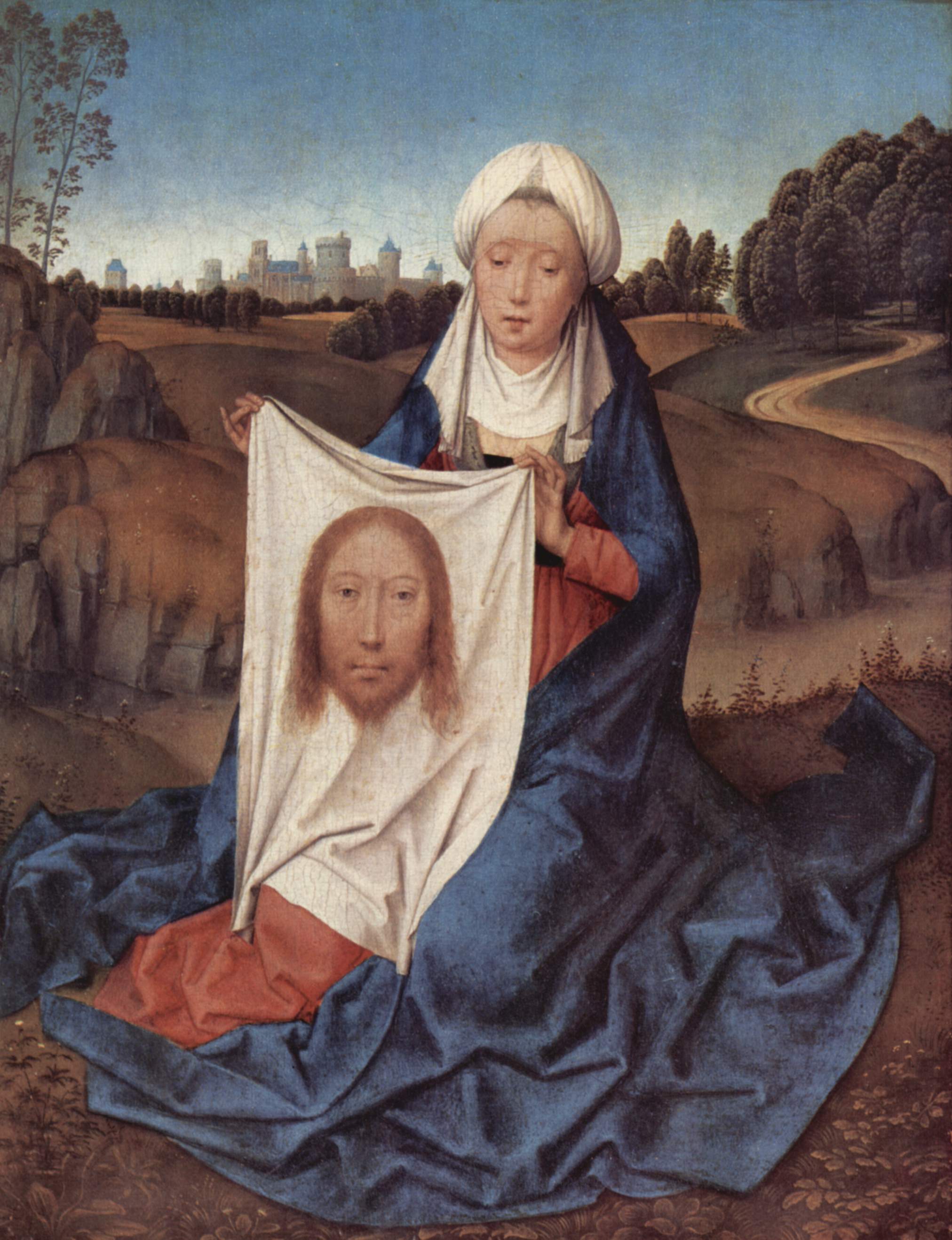|
Eustache Marcadé
Eustache Marcadé was born in Artois at an unknown date and died in 1440. He was responsible for one of the first mysteries. He was provost of Dampierre, official of the Abbey of Corbie from 1414 and dean of the "Faculté de Décret", the forerunner of the Faculty of laws. He was removed from office in 1427 and reinstated by a court in 1437. Passion of Arras He is credited with "Le Mystère de la Passion", commonly known as the "Passion of Arras", which was performed at Arras by 1420-1430 and at Metz in 1437. This mystery has 24,944 octosyllables and takes place on four days. The prologue describes the "trial" of Paradise "where God hears the testimony of Justice and Mercy on the evils fSatan in the world." God decides to send his son to redeem mankind. The first three days are devoted to the life of Jesus on earth, from birth to the Passion. On the fourth day, he goes to heaven to report on his work of redemption. The manuscript of the Passion of Arras contains another m ... [...More Info...] [...Related Items...] OR: [Wikipedia] [Google] [Baidu] |
Artois
Artois ( ; ; nl, Artesië; English adjective: ''Artesian'') is a region of northern France. Its territory covers an area of about 4,000 km2 and it has a population of about one million. Its principal cities are Arras (Dutch: ''Atrecht''), Saint-Omer, Lens, and Béthune. It is the eponym for the term '' artesian''. Location Artois occupies the interior of the Pas-de-Calais ''département'',"Artois" in ''The New Encyclopædia Britannica''. Chicago: Encyclopædia Britannica Inc., 15th ed., 1992, Vol. 1, p. 607. the western part of which constitutes the former Boulonnais. Artois roughly corresponds to the arrondissements of Arras, Béthune, Saint Omer, and Lens, and the eastern part of the arrondissement of Montreuil. It occupies the western end of the coalfield which stretches eastward through the neighbouring Nord ''département'' and across central Belgium. History Originally a feudal county itself, Artois was annexed by the county of Flanders. It came to France in ... [...More Info...] [...Related Items...] OR: [Wikipedia] [Google] [Baidu] |
Mystery Play
Mystery plays and miracle plays (they are distinguished as two different forms although the terms are often used interchangeably) are among the earliest formally developed plays in medieval Europe. Medieval mystery plays focused on the representation of Bible stories in churches as tableaux with accompanying antiphonal song. They told of subjects such as the Creation, Adam and Eve, the murder of Abel, and the Last Judgment. Often they were performed together in cycles which could last for days. The name derives from ''mystery'' used in its sense of ''miracle,'' but an occasionally quoted derivation is from ''ministerium'', meaning ''craft'', and so the 'mysteries' or plays performed by the craft guilds. Origins As early as the fifth century living tableaux were introduced into sacred services. The plays originated as simple ''tropes'', verbal embellishments of liturgical texts, and slowly became more elaborate. At an early period chants from the service of the day were added t ... [...More Info...] [...Related Items...] OR: [Wikipedia] [Google] [Baidu] |
Octosyllable
The octosyllable or octosyllabic verse is a line of verse with eight syllables. It is equivalent to tetrameter verse in trochees in languages with a stress accent. Its first occurrence is in a 10th-century Old French saint's legend, the '' Vie de Saint Leger''; another early use is in the early 12th-century Anglo-Norman '' Voyage de saint Brendan''. It is often used in French, Italian, Spanish and Portuguese poetry. While commonly used in couplets, typical stanzas using octosyllables are: décima, some quatrains, redondilla. In Spanish verse, an octosyllable is a line that has its seventh syllable stressed, on the principle that this would normally be the penultimate syllable of a word (''Lengua Castellana y Literatura'', ed. Grazalema Santillana. El Verso y su Medida, p. 46). If the final word of a line does not fit this pattern, the line could have eight or seven or nine syllables (as normally counted), thus – :1 / 2 / 3 / 4 / 5 / Gra/NA/da :1 / 2 / 3 / 4 / 5 / Ma/DR ... [...More Info...] [...Related Items...] OR: [Wikipedia] [Google] [Baidu] |
Paradise
In religion, paradise is a place of exceptional happiness and delight. Paradisiacal notions are often laden with pastoral imagery, and may be cosmogonical or eschatological or both, often compared to the miseries of human civilization: in paradise there is only peace, prosperity, and happiness. Paradise is a place of contentment, a land of luxury and fulfillment. Paradise is often described as a "higher place", the holiest place, in contrast to this World (theology), world, or underworlds such as Hell. In eschatological contexts, paradise is imagined as an Entering heaven alive, abode of the virtuous dead. In Christianity and Islam, Heaven is a paradisiacal relief. In old Egyptian beliefs, the underworld is Aaru, the reed-fields of ideal hunting and fishing grounds where the dead lived after judgment. For the Celts, it was the Fortunate Isles, Fortunate Isle of Mag Mell. For the classical Greeks, the Elysium, Elysian fields was a paradisiacal land of plenty where the heroic and ri ... [...More Info...] [...Related Items...] OR: [Wikipedia] [Google] [Baidu] |
Jesus
Jesus, likely from he, יֵשׁוּעַ, translit=Yēšūaʿ, label=Hebrew/Aramaic ( AD 30 or 33), also referred to as Jesus Christ or Jesus of Nazareth (among other names and titles), was a first-century Jewish preacher and religious leader; he is the central figure of Christianity, the world's largest religion. Most Christians believe he is the incarnation of God the Son and the awaited Messiah (the Christ) prophesied in the Hebrew Bible. Virtually all modern scholars of antiquity agree that Jesus existed historically. Research into the historical Jesus has yielded some uncertainty on the historical reliability of the Gospels and on how closely the Jesus portrayed in the New Testament reflects the historical Jesus, as the only detailed records of Jesus' life are contained in the Gospels. Jesus was a Galilean Jew who was circumcised, was baptized by John the Baptist, began his own ministry and was often referred to as "rabbi". Jesus debated with fellow Jews on ho ... [...More Info...] [...Related Items...] OR: [Wikipedia] [Google] [Baidu] |
Passion (Christianity)
In Christianity, the Passion (from the Latin verb ''patior, passus sum''; "to suffer, bear, endure", from which also "patience, patient", etc.) is the short final period in the life of Jesus Christ. Depending on one's views, the "Passion" may include, among other events, Jesus' triumphal entry into Jerusalem, his cleansing of the Temple, his anointing, the Last Supper, Jesus' agony in the Garden, his arrest, his Sanhedrin trial, his trial before Pontius Pilate, his crucifixion and his death on Good Friday, his burial, and the resurrection of Jesus. Those parts of the four canonical Gospels that describe these events are known as the "Passion narratives". In some Christian communities, commemoration of the Passion also includes remembrance of the sorrow of Mary, the mother of Jesus, on the Friday of Sorrows. The word ''passion'' has taken on a more general application and now may also apply to accounts of the suffering and death of Christian martyrs, sometimes using the ... [...More Info...] [...Related Items...] OR: [Wikipedia] [Google] [Baidu] |
Vindicta Salvatoris
(In English: The Avenging of the Saviour or The Vengeance of the Saviour) is a text of New Testament Apocrypha that expands the story of the aftermath of Jesus's execution. It was often presented as a supplement to the Gospel of Nicodemus. The oldest known copies are two Latin versions of the , both dated to the 8th or 9th centuries and likely when the work was authored. The work is thought to have been composed in southern France, perhaps the Aquitaine region. The is a virulently anti-Jewish work. According to it, the Jews are collectively guilty of the crime of killing Christ, and deserve torment and death. Divine favour will come to Christians who mete out God's justice on the Jews by killing them. The work also includes a retelling of the story of Saint Veronica's miraculous veil, imprinted with the face of Jesus, from the slightly earlier ''Cura sanitatis Tiberii'' legend. Content In The Vengeance of the Saviour, Nathan, an Ishmaelite (Arab), leaves Judea and trave ... [...More Info...] [...Related Items...] OR: [Wikipedia] [Google] [Baidu] |
Arnulf Gréban
Arnulf is a masculine German given name. It is composed of the Germanic elements ''arn'' "eagle" and ''ulf'' "wolf". The ''-ulf, -olf'' suffix was an extremely frequent element in Germanic onomastics and from an early time was perceived as a mere suffix forming given names. Similarly, the suffix ''-wald, -ald, -old'', originally from ''wald'' "rule, power" underwent semantic weakening. Therefore, the name ''Arnulf'' and ''Arnold'' were often conflated in early medieval records, as is the case with bishop Arnulf of Metz (died 640), especially as the final consonant came to be dropped (''Arnoul''). The name ''Arnulf'' is attested from as early as the 5th century, as the name of the brother of Odoacer. The name is attested with some frequency in Medieval Germany throughout the 8th to 11th centuries, in the spelling variants ''Arnulf, Arnulph, Arnolf'', occasionally also as ''Arenulph, Harnulf, Harnolf, Harnolph''. In the 9th century, Arnulf of Carinthia was the ruler of East Fra ... [...More Info...] [...Related Items...] OR: [Wikipedia] [Google] [Baidu] |
French Poets
List of poets who have written in the French language: A * Louise-Victorine Ackermann (1813–1890) * Adam de la Halle (v.1250 – v.1285) * Pierre Albert-Birot (1876–1967) * Anne-Marie Albiach (1937–2012) * Pierre Alféri (1963) * Marc Alyn (1937) * Catherine d'Amboise (1475–1550) * Jean Amrouche (1906–1962) * Guillaume Apollinaire (1880–1918) * Louis Aragon (1897–1982) * Jacques Arnold (1912–1995) * Hans Arp (1887–1966) * Antonin Artaud (1896–1948) * Théodore Agrippa d'Aubigné (1552–1630) * Jacques Audiberti (1899–1965) * Pierre Autin-Grenier (1947) B * Jean-Antoine de Baïf (1532–1589) * Théodore de Banville (1823–1891) * Jules Barbey d'Aurevilly (1807–1889) * Henri Auguste Barbier (1805–1882) * Natalie Clifford Barney (1876–1972) * Linda Maria Baros (1981) * Guillaume de Salluste Du Bartas (1544–1590) * Henry Bataille (1872–1922) * Henry Bauchau (1913–2012) * Charles Baudelaire (1821–1867) * Marcel Béalu (1908–1993) * Phili ... [...More Info...] [...Related Items...] OR: [Wikipedia] [Google] [Baidu] |
French Male Poets
French (french: français(e), link=no) may refer to: * Something of, from, or related to France ** French language, which originated in France, and its various dialects and accents ** French people, a nation and ethnic group identified with France ** French cuisine, cooking traditions and practices Fortnite French places Arts and media * The French (band), a British rock band * "French" (episode), a live-action episode of ''The Super Mario Bros. Super Show!'' * ''Française'' (film), 2008 * French Stewart (born 1964), American actor Other uses * French (surname), a surname (including a list of people with the name) * French (tunic), a particular type of military jacket or tunic used in the Russian Empire and Soviet Union * French's, an American brand of mustard condiment * French catheter scale, a unit of measurement of diameter * French Defence, a chess opening * French kiss, a type of kiss involving the tongue See also * France (other) * Franch, a surname * French ... [...More Info...] [...Related Items...] OR: [Wikipedia] [Google] [Baidu] |
15th-century French Dramatists And Playwrights
The 15th century was the century which spans the Julian dates from 1 January 1401 ( MCDI) to 31 December 1500 ( MD). In Europe, the 15th century includes parts of the Late Middle Ages, the Early Renaissance, and the early modern period. Many technological, social and cultural developments of the 15th century can in retrospect be seen as heralding the "European miracle" of the following centuries. The architectural perspective, and the modern fields which are known today as banking and accounting were founded in Italy. The Hundred Years' War ended with a decisive French victory over the English in the Battle of Castillon. Financial troubles in England following the conflict resulted in the Wars of the Roses, a series of dynastic wars for the throne of England. The conflicts ended with the defeat of Richard III by Henry VII at the Battle of Bosworth Field, establishing the Tudor dynasty in the later part of the century. Constantinople, known as the capital of the world an ... [...More Info...] [...Related Items...] OR: [Wikipedia] [Google] [Baidu] |
1440 Deaths
144 may refer to: * 144 (number), the natural number following 143 and preceding 145 * AD 144, a year of the Julian calendar, in the second century AD * 144 BC, a year of the pre-Julian Roman calendar * ''144'' (film), a 2015 Indian comedy * ''144'' (video game), working title of ''The Path'', a psychological horror art game * 144 (New Jersey bus), a bus route in New Jersey, USA * Volvo 144, the main 4-door sedan model of the Volvo 140 Series * Worcestershire bus route 144 Worcestershire bus route 144 is a bus service connecting the Worcestershire areas of Catshill, Bromsgrove. Droitwich and Worcester, operated by First Worcestershire. The service dates back to 1914 and was one of the longest-running double-deck ... See also * List of highways numbered 144 * {{numberdis ... [...More Info...] [...Related Items...] OR: [Wikipedia] [Google] [Baidu] |





